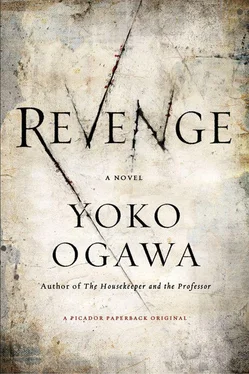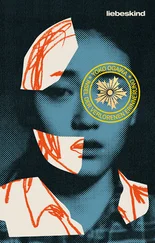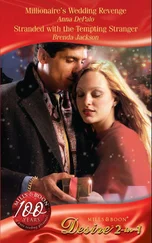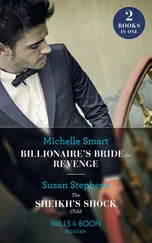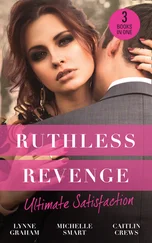* * *
I saw him for the last time in February, after he had been let out on parole. The clouds were low and the wind had been blowing hard all day. I had wandered for a long time, hands in my pockets, head bent in the wind, searching for his apartment. What I found at last was practically a ruin: a long, squat building with two lines of unadorned windows. No flower boxes, not even laundry hung out to dry. The walls were stained, the gutters pulled loose in places, the banisters crooked. It was perfectly silent except for the mewing of a cat hiding in the weeds near the door.
I checked the mailboxes to be sure I hadn’t made a mistake. My uncle’s name was written in magic marker on the box for number 201—though the characters were shaky and smeared by the rain. Peering in the box, I saw nothing but darkness, not a postcard or even an advertising flyer.
I opened the door to the apartment. “Uncle!” I called. “Uncle! It’s me!” From somewhere inside, I heard the sound of labored breathing. I took off my shoes and slid open the inner door, but then I froze, unable to find a place to set my foot. The entire apartment was filled with a mound of garbage—though “garbage” wasn’t exactly the right word for it. These were objects that had once been useful but were no longer so. A mountain of random things, with no discernible connection between them.
“Oh, you’ve come.” His voice sounded weak, muffled as it was by the mound of clutter. “Well, don’t stand there all day. Come and let me look at you.”
“I’d like to, but I’m not sure how,” I said.
“Not to worry,” he said. “Just come past the refrigerator, by the radio, slip behind the chest, and you’re there.” Following his instructions, I made my way cautiously into the apartment.
Worn-out socks, barbecue utensils, a set of encyclopedias, pieces of a clarinet, cans of cat food, pots without handles, dried-up bars of soap, a microscope, a marionette, a stuffed weasel … The sheer variety of items made me dizzy. Tightly packed in a giant mass, they filled the entire room, covering the windows and piled nearly to the ceiling. But somehow I managed to find him inside of it all.
“It’s true, you’re really here,” he said. “But come closer. My eyes are bad and I want to get a look at you.” He was stretched out in a tiny space near the middle of the room, all but buried in his things. His trembling hand reached toward me. I took it and held it to my cheek.
“I remember that face,” he said. “And those soft hands. You haven’t changed a bit.” He, however, was nearly unrecognizable. He had grown terribly thin, his collarbone and shoulders jutting out sharply. I held tight to his hand.
“Thanks for the Christmas cards,” I said.
“I don’t send them to anyone else anymore.”
I hesitated a moment, but then I decided to push back the things near his head and I knelt beside him.
“How are you getting along?” I said. I wanted to talk to him about the disaster in his apartment, but I didn’t know how to broach the topic.
“I can’t complain. Though the cold makes my neuralgia act up.”
He was wrapped in a thin blanket, more a towel really, and so filthy that its original color was impossible to guess. There was no sign of a heater anywhere—but I had the feeling that this mass of objects gave off a warmth of its own.
“You haven’t come to see us,” I said.
“I know, there’s always something…”
“Are you eating?” I asked. “You have to keep up your strength.”
“All of a sudden you’re grown and worrying about me, instead of the other way around. Seems like yesterday you were just a little boy.”
“I’m at the university now.”
“What are you studying?”
“French literature,” I told him.
“Wonderful! Absolutely wonderful.” He closed his swollen eyes and squeezed my hand, apparently on the verge of tears.
“Oh, I almost forgot. I brought you a present. Can you guess where I’ve hidden it?” Not wanting to see him cry, I forced myself to sound jolly. He let out a sound that was something between a cough and a laugh, and I produced a box of chocolates from the inner pocket of my jacket. “Weren’t these always your favorites?”
“They were indeed,” he said. “Thank you. But I never thought I’d see the day when you would bring me presents.”
I balanced the box on a toaster, resting on a tricycle, and almost immediately it blended in, becoming part of the pile.
As I studied the mass more closely, I began to feel that it was not the product of random accumulation but that it actually had a coherent form all its own; and while the individual items were dirty and deteriorating, taken together they were like a strange piece of art.
Something else became apparent: many of these scraps of wood and chains and leather were, in fact, the remains of exhibits from his museum. A twisted belt with buckles nearly torn off might have been used to bind the wrists; a whip with a broken handle; a rusted weight that could have crushed bone. But they were ruined, no longer suitable for causing pain; the devices themselves almost seemed to be the victims. They looked exhausted, ready to die.
I looked down at my feet and realized I was staring at the brace. The feeling of suffocation came back to me in an instant—the sweat under the collar, the plate against my back. Then I saw that he was lying next to a knot of old braces that looked impossible to untangle.
“I remember those,” I said, and my uncle seemed to know what I meant without even turning his head.
“You do?” he said. “That was a great invention, even if it didn’t sell. I still get New Year’s cards from clients who are taller thanks to those braces. They think of me as their benefactor, and when I see them, I feel as though my life hasn’t been a complete waste.”
He closed his eyes, pulled his blanket up to his chin, and curled into a ball. When he coughed, a shudder ran down his back.
The wind blew outside, rattling the windows. A tiny creature—a mouse or a cockroach perhaps—scurried along the edge of my vision before disappearing into the instruments of torture. There was a quiet rustling and then silence again.
“Take one with you, if you like. I have plenty. Who knows, it could still help.”
“Thanks,” I said.
The kitchen was at the back of the apartment, but there was no sign that it was in use. The sink was filled with dozens of empty cologne bottles.
“Whatever happened to the tiger?” I asked.
“He died in the garden,” he said. “It was a beautiful death.”
We were quiet then for a moment. The only sound was the wind at the window. His arms reached out from under the blanket. I took his hands in mine, and it seemed to me that we were praying for the tiger.
* * *
“It’s started to snow,” he said sometime later.
“How can you tell?”
“The wind has died.”
“Do you have a heavier blanket? You need to keep warm.”
“I’m fine like this,” he said. “You’re the one who’ll catch cold. You should wear this home,” he said, plunging his hand into the mound next to him and pulling out a fur coat.
“It’s wonderful,” I said. “You should use it for a blanket. I don’t need it.”
“Don’t say that. I want you to have it. It’s the only thing I have to leave you.”
“Well then,” I said. “Thank you.”
He closed his eyes again and a look of satisfaction spread over his face. A few minutes later his breath fell into the regular rhythm of sleep.
* * *
Where had it all come from? Outside, the world lay under a blanket of white, just as my uncle had said. The air was still, and large snowflakes drifted out of the night sky. The street was empty, and the cat that had been lurking near the entrance had disappeared. I walked gingerly over the unmarked snow. When I turned to look back, the window was dark.
Читать дальше
